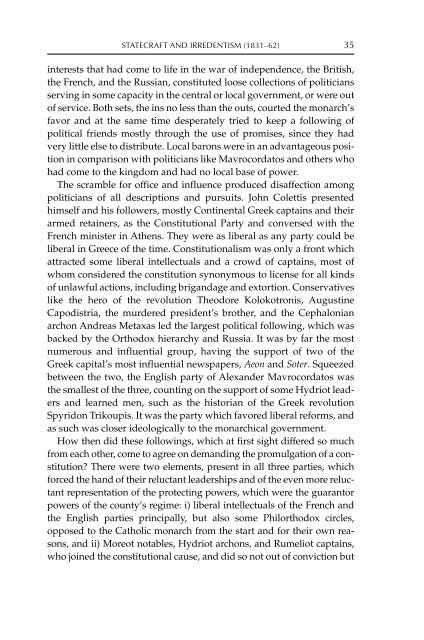MODERN GREECE: A History since 1821 - Amazon Web Services
MODERN GREECE: A History since 1821 - Amazon Web Services
MODERN GREECE: A History since 1821 - Amazon Web Services
You also want an ePaper? Increase the reach of your titles
YUMPU automatically turns print PDFs into web optimized ePapers that Google loves.
STATECRAFT AND IRREDENTISM (1831–62) 35<br />
interests that had come to life in the war of independence, the British,<br />
the French, and the Russian, constituted loose collections of politicians<br />
serving in some capacity in the central or local government, or were out<br />
of service. Both sets, the ins no less than the outs, courted the monarch’s<br />
favor and at the same time desperately tried to keep a following of<br />
political friends mostly through the use of promises, <strong>since</strong> they had<br />
very little else to distribute. Local barons were in an advantageous position<br />
in comparison with politicians like Mavrocordatos and others who<br />
had come to the kingdom and had no local base of power.<br />
The scramble for office and influence produced disaffection among<br />
politicians of all descriptions and pursuits. John Colettis presented<br />
himself and his followers, mostly Continental Greek captains and their<br />
armed retainers, as the Constitutional Party and conversed with the<br />
French minister in Athens. They were as liberal as any party could be<br />
liberal in Greece of the time. Constitutionalism was only a front which<br />
attracted some liberal intellectuals and a crowd of captains, most of<br />
whom considered the constitution synonymous to license for all kinds<br />
of unlawful actions, including brigandage and extortion. Conservatives<br />
like the hero of the revolution Theodore Kolokotronis, Augustine<br />
Capodistria, the murdered president’s brother, and the Cephalonian<br />
archon Andreas Metaxas led the largest political following, which was<br />
backed by the Orthodox hierarchy and Russia. It was by far the most<br />
numerous and influential group, having the support of two of the<br />
Greek capital’s most influential newspapers, Aeon and Soter. Squeezed<br />
between the two, the English party of Alexander Mavrocordatos was<br />
the smallest of the three, counting on the support of some Hydriot leaders<br />
and learned men, such as the historian of the Greek revolution<br />
Spyridon Trikoupis. It was the party which favored liberal reforms, and<br />
as such was closer ideologically to the monarchical government.<br />
How then did these followings, which at first sight differed so much<br />
from each other, come to agree on demanding the promulgation of a constitution?<br />
There were two elements, present in all three parties, which<br />
forced the hand of their reluctant leaderships and of the even more reluctant<br />
representation of the protecting powers, which were the guarantor<br />
powers of the county’s regime: i) liberal intellectuals of the French and<br />
the English parties principally, but also some Philorthodox circles,<br />
opposed to the Catholic monarch from the start and for their own reasons,<br />
and ii) Moreot notables, Hydriot archons, and Rumeliot captains,<br />
who joined the constitutional cause, and did so not out of conviction but


